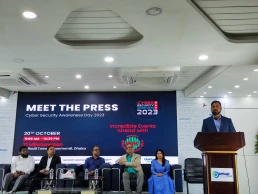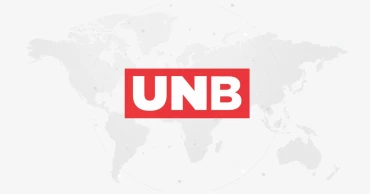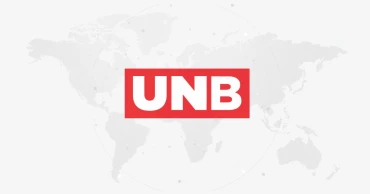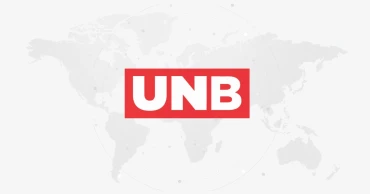Cyber Security
Strengthen cyber security ahead of election: Prof Yunus
Chief Adviser Prof Muhammad Yunus, also chairman of the National Cyber Security Council, on Sunday said the government needs to strengthen its technological capacity ahead of the national election and take strict action against all forms of cybercrime.
The Chief Adviser directed the National Cyber Security Agency to ensure robust cyber security ahead of the upcoming parliamentary election and referendum.
The directive came at a meeting of the National Cyber Security Council held at the State Guest house Jamuna with the Chief Adviser in the chair.
He said the government is working to bring all citizen services on online platforms and many services are already being delivered digitally at home and abroad.
To ensure these services remain secure and uninterrupted, the Chief Adviser said, strengthening cyber security is essential.
Professor Yunus instructed the authorities concerned to give special priority to sectors providing citizen services. “Institutions including the Cyber Security Agency that adopt cyber security measures must regularly update their software and hardware, while the personnel involved must also be made more skilled.”
Institutions and related personnel should be brought under a rating system so that proper evaluation of cyber security and overall performance becomes easier, he said.
Prof Yunus directed the National Cyber Security Agency to play an effective role alongside the judiciary to ensure that no one involved in crimes in the financial sector goes unpunished.
At the meeting, Chief Adviser’s Special Assistant for the Ministry of Posts, Telecommunications and Information Technology Faiz Ahmad Taiyeb i said 35 institutions have already been listed as Critical Information Infrastructure and suggested including more institutions in the list.
He stressed the importance of coordination between the National Cyber Security Agency and the BTRC to prevent rumours, misinformation, disinformation and other cybercrimes surrounding the upcoming election.
Bangladesh Bank Governor Ahsan H Mansur said various measures have already been taken to further strengthen cyber security in the banking sector and more initiatives are in the pipeline.
He also praised the initiative to form sectoral Computer Emergency Response Teams.
Member Secretary of the National Cyber Security Council and Director General of the National Cyber Security Agency Dr Md Tayebur Rahman presented the agency’s activities and future action plans through a PowerPoint presentation.
He also detailed the ‘Cyber Incident Reporting and Response System’ designed for receiving complaints of cybercrimes and processing them.
Others present at the meeting included Law Adviser Dr Asif Nazrul, ICT Secretary Shish Haider Chowdhury, Inspector General of Police Baharul Alam and National Board of Revenue Chairman Md Abdur Rahman Khan.
Following the promulgation of the Cyber Security Ordinance 2025 on May 21, the National Cyber Security Council was formed on August 26 to ensure cyber security for state institutions and citizens under the amended ordinance.
1 month ago
“Cyber Security Awareness Day 2023” will be held Saturday on DIU campus
A cyber security awareness event styled "Cyber Security Awareness Day 2023" will be held Saturday on Daffodil Smart City Campus in Dhaka.
Bangladesh Telecommunication Regulatory Commission (BTRC) and Daffodil International University (DIU) are jointly organising the function.
DIU’s Science and Information Technology faculty Dean Prof Dr Sayeed Akhter Hossain and BTRC's Director General Brig Gen Mohammad Khalil-Ur-Rahman announced this at a press conference at 71 Milonayoton of Daffodil Tower in Dhaka’s Dhanmondi on Friday.
Names of 'Bangabandhu International Cyber Security Awareness Award' recipients announced
BTRC Chairman Shyam Sunder Sikder is expected to inaugurate the programme as the chief guest.
Khalill-Ur-Rahman said cyber awareness is needed for each person of the country. The BTRC is continuously doing their best to make people aware of cyber security. In continuation of this the state-owned organisation is assisting the DIU in holding tomorrow’s event on tech-savvy.
BRTC Commissioner Dr. Musfiq Mannan Choudhury will present the keynote speech on "Cyber security challenges for developing nations," at the event chaired by DIU Vice Chancellor Prof Dr. M. Lutfar Rahman.
Calls for Bangladesh and India to collaborate in dealing with cyber threats
Noted figures including Prof Dr. Mohammad Mahfuzul Islam and Prof Dr. S.M. Mahbub Ul Haque Majumder, among others are expected to join the event.
Following the opening, participants will join two informative technical sessions--contemporary cyber security trends, challenges, and solutions, and cyberbullying.
The day-long programme will also feature more technical sessions exploring the vulnerabilities in code and the compromised quality of software.
The organisers said the session will be highly relevant to software developers, highlighting the necessity of producing secure code and ensuring the quality of software products.
Bangladesh, India to collaborate with each other to combat cyberattacks: Palak
A crucial discussion panel titled "Cyber Preparedness of Network Systems for the Private and Government Sector,” with the participation of Bangladesh Bank Executive Director (ICTD) Muhammad Zakir Hasan and BRTC Director General (Systems & Services) Brig Gen Mohammad Khalil-Ur-Rahman, is expected to be a focal point of the event.
The programme reflects escalating the need for awareness, preparation, and vigilance in an increasingly interconnected digital society.
2 years ago
TechCrunch says Bangladesh govt website has leaked citizens’ personal data
TechCrunch, an American online news platform focusing on high tech and startups, says that a Bangladeshi government website has leaked the personal information of citizens.
The data leak includes full names, phone numbers, email addresses, and national ID numbers of millions of Bangladeshi citizens, TechCrunch quoted a researcher who discovered the leak.
Read: Personal data hack of 100s of German politicians, celebs
The leak was “accidentally discovered” by Viktor Markopoulos who works for Bitcrack Cyber Security. He then contacted the Bangladeshi e-Government Computer Incident Response Team.
Markopoulos said, finding the data “was too easy.”
“It just appeared as a Google result and I wasn’t even intending on finding it. I was Googling an SQL error and it just popped up as the second result,” he told TechCrunch, referring to SQL, a language designed for managing data in a database.
Read: 8 arrested in Hong Kong for posting personal data on police
TechCrunch said it was able to verify that the leaked data was “legitimate” through using a portion to query a public search tool on the affected website. The government website apparently returned other data contained in the leaked database, such as the name of the person who applied to register, as well as — in some cases — names of their parents.
TechCrunch, in the report published on July 7, 2023, said it attempted the process with 10 different sets of data, and all returned correct data.
The US news platform, however, did not name the government website as data is still available online.
It also said it has not heard back from any of the Bangladeshi government organisations that were emailed, asking for remarks and alerting of the data leak.
Read more: Facebook: Hackers accessed personal data from 29M accounts
2 years ago
Understanding VPN: The Comprehensive Guide
From online frauds, and scams to even hacking sensitive personal information, the Internet these days seems to be a haven for fraudsters. There’s a growing concern about internet security and how it might jeopardize the security of information and finance of people and organizations. VPN or Virtual Private Network can be a solution to such problems. Millions of people around the world are adopting VPNs for their data security and safe online browsing. So here’s a beginner's guide on VPN. Let’s find out how a VPN works, the benefits, and the types of VPNs.
What is a VPN?
VPN stands for Virtual Private Network. Generally, the internet is provided through an ISP which processes all of their user’s traffic simultaneously. This makes them susceptible to malicious attacks which might intercept the net traffic to access personal data.
A VPN works as an intermediary between the computer and the destination to make it untraceable. There are a few complicated steps involved in the process. Let’s have a look.
Read more: How to Protect Your YouTube Channel from Getting Hacked
How Does VPN Work?
VPN creates a secure channel between the computer and the intended destination by developing a private network just for the user. The data gets encrypted and sent directly to the VPN server. There it gets decoded and sent to the intended location. This middle encryption allows the data to be completely untraceable by anyone.
Every device has a unique IP address that can be used to trace all of its activity. VPN essentially masks the IP address and assigns a new IP address from their server. As a result, the data becomes completely untraceable even by the ISP. VPN works not only to maintain anonymity online and protect privacy but also to allow users to access region-specific content.
Benefits of Using a VPN
There are a lot of benefits to using VPN. Here are a mentionable few.
Enhanced Privacy
VPN brings enhanced privacy thanks to the end-to-end encryption between you and the VPN server, making it impossible to be tracked by a third party.
Read More: Bank Account Hacking Protection: How to save financial accounts from hackers?
Secured Data Transmission
The end-to-end computer-to-server extension also allows for secured data transmission. This is especially helpful if a user is in a public network zone like using free wifi. It's impossible to tell who else is signed into the network and what kind of monitoring they might be running. Secured encryption allows for safe data transmission.
Bypassing Geographical Restrictions
VPN helps to bypass geographical restrictions so that a user can access services that might not be available in their location or to evade censorship. For example, Netflix has a host of shows that are available in the UK but not in India. With VPN, a user from India can reroute their IP through the UK and access all the contents regardless of the restrictions.
2 years ago
Mustafa Jabbar wants cyber security in primary school curriculum
Minister for Posts and Telecommunications Mustafa Jabbar wants inclusion of ‘Cyber Security’ in primary school curriculum of Bangladesh.
Jabbar came up with the remarks while addressing, as chief guest, a discussion on ‘Youth workshop for safe internet-2022’ organised to create awareness on cyber security at the Conference Centre of Bangladesh Telecommunication Regulatory Commission (BTRC) on Thursday (October 13, 2022).
BTRC Chairman Shyam Sunder Sikdar presided over the programme where Cyber Crime Awareness Foundation President Kazi Mustafiz delivered welcome speech, Director General of BTRC’s System and Services Division Brigadier General Md Nasim Parvez presented the keynote speech.
Read: Workshop on digital literacy for cyber security held
Urging the Home Ministry to underscore digital crimes, Jabbar said every police station should have a cyber or digital crime unit with trained officials.
The BTRC chairman said they took an initiative to set up a cyber-observation lab to ensure security.
He said the Education Ministry should take steps to initiate class on cyber security, one day a week, to generate awareness among students.
Read Specific policy needed to ensure cyber security of power sector: Nasrul Hamid
“Though none should refrain from using technology, we should be more careful and protect our families and society from digital crime,” the BTRC chairman observed.
He said BTRC has already submitted an outline to bring owners of social media platforms under law to the ministry.
Daffodil International University’s Computer Science and Engineering department Head Prof Dr Touhid Bhuiyan, Digital Security Agency Director Tarique M Barkatullah and Additional Commissioner of Cyber Security department of police Nazmul Islam, among others spoke at the discussion on ‘Youth workshop for safe internet-2022’.
Read Cybersecurity Career Guide: How to Become a Cybersecurity Expert?
3 years ago
Specific policy needed to ensure cyber security of power sector: Nasrul Hamid
State Minister for Power, Energy and Mineral Resources Nasrul Hamid has directed the officials of the power sector to frame a specific policy guideline to ensure cyber security of the sector.
“A protocol for ensuring external security as well as cyber security is very essential. You have to create a huge awareness about cyber security”, he told the officials while inaugurating a workshop titled: “Cyber Security in Power Sector–Policy and Operational Perspective” at Biduyt Bhaban in the city on Monday.
Bangladesh Power Management Institute (BPMI) organized the workshop for officials of the state-owned power sector entities.
Nasrul said the use of information technology has been increasing day by day in the country’s power sector.
Also read: Despite 40 pc surplus capacity, BPDB buys 6 pc of electricity from pricier rental power plants
“Different devices of the automated system have to be aligned with online communication. So, the risk of cyber threats is increasing. We have to create necessary awareness and achieve the efficiency to face unexpected challenges”, he said.
The function, with BPMI rector Mohsin Chowdhury in the chair, was also addressed by Power Secretary Habibur Rahman.
Khulna University of Engineering and Technology (KUET) Professor Kazi Md Rakibul Alam made a keynote presentation on “Fundamental Features of Cyber Security” while managing director of Dhaka Electric Supply Company (Desco) Kausar Ameer Ali on “Scope, Necessity and Policies of Cyber Security in Power Sector” and Microsoft chief information security officer Md Mushfiqur Rahman made presentation on Security in Power Sector-Cyber Threats, Design, Implementation and Monitoring Defensive Zero Trust Architecture.
The state minister said that research and development initiatives should be encouraged in promoting preemptive measures against cyber threat, risk management, facing security threat, and ensuring safety of information and reduction of supply chain risk.
Also read: Any rise in power, gas tariff to be suicidal: FBCCI
“Every organisation has to take initiative to develop the human resources in facing challenges against the cyber security threats,” he added.
3 years ago
Bangabandhu global cyber security awareness award to be introduced: Palak
State Minister for ICT Zunaid Ahmed Palak on Thursday said the ‘UNDP-Bangladesh Bangabandhu Sheikh Mujibur Rahman Global Cyber Security Awareness Award’ will be introduced in the next year with a view to making the cyber world safe.
He said this at a press conference in the USA on the eve of the Golden Jubilee Bangladesh Concert in New York, said a press release.
The ICT Division is going to arrange the ‘Golden Jubilee Bangladesh Concert’ at Madison Square in New York on Friday (May 06) under the management of Bangladesh Hi-Tech Park Authority.
Also read: UNDP, ICT Division sign deal to launch cybersecurity awareness campaign
The concert is being arranged on the occasion of the golden jubilee of Bangladesh’s Independence to commemorate the unique initiative (Concert for Bangladesh) of Ravi Shankar and George Harrison during the 1971 Liberation War.
The State Minister said now the locally produced mobile phones meet 90 percent of domestic demand and the remaining 10 percent mobile phones are exported.
He said Walton is producing laptops in Bangladesh. Now ‘Made in Bangladesh’ is a popular name all over the world, he added.
Also read: Bangladesh wants to work as knowledge partner with Tripura: Palak
In the conference, it said that some 4,000 tickets for the Golden Jubilee Bangladesh Concert have already been sold. The earnings from the concert will be provided to UNDP fund for cyber security.
Managing Director of Bangladesh Hi-tech Park Authority Bikarna Kumar Ghosh presided over the function moderated by Consul General of the Bangladesh Consulate General in New York Dr Mohammad Monirul Islam.
3 years ago
Cooperation on Cyber Security: First Colombo Security Conclave virtual workshop held
The first-ever "Colombo Security Conclave (CSC)" virtual workshop ended on Tuesday with the participants agreeing to identify key deliverables and continue to work on the way forward for cooperation on cyber security. The two-day workshop titled “Developing Regional Cyber Security Capabilities on Defensive operations, Deep/Dark Web handling and Digital Forensics” was hosted by the National Security Council Secretariat (NSCS), government of India in association with National Forensics Science University, Gandhinagar (Gujarat) and the Secretariat of the CSC.
Read: Cyber security issues dominate US-Bangladesh meet Delegates from Member and Observer States of Colombo Security Conclave (CSC), including Sri Lanka, the Maldives, India, Mauritius, Seychelles, and Bangladesh participated in the workshop. At the 5th Deputy NSA Level Meeting of the Colombo Security Conclave held on August 4, 2021, Members and Observer States had agreed on four pillars of cooperation including maritime safety and security, terrorism and radicalization, trafficking and organized crime and cyber security and protection of critical infrastructure. The workshop was the inaugural activity under the fourth pillar, according to the Press Information Bureau of India. It addressed the key areas of deep web and dark net investigation and challenges; digital forensics; cyber threat intelligence; and defensive operations in the cyber domain.
Read: Bangladesh Bank tops Cyber Drill 2021 The discussants focused on technological advancements, research challenges and approaches in these areas. They also shared their experiences in dealing with cyber security threats and discussed solutions to specific cyber security challenges.
4 years ago
Cyber security issues dominate US-Bangladesh meet
Top Bangladeshi and US officials argy-bargied over issues like IT and cyber security during the week-long discussions in Washington DC.
Issues like digital economy partnership, global village, protection of technology, parallel policies, infrastructure and altered technology were also discussed at theUS-Bangladesh ICT Consultation meeting held from November 14-19.
The meeting with officials of the US Commerce Department was fruitful, said Hasanul Haque, head of the Bangladeshi delegation.
READ: Huawei renews cyber security cooperation MoU with Indonesia
"Discussions on what we need to do now to establish the freedom of speech on the internet as well as the security of individuals, society and the state were made," he said.
"From this we got a clear idea about the role of stakeholders and the responsibility of the state. Besides, we've got some guidelines to ensure the safety of the inhabitants of the global village and their equal opportunity in the digital economy."
In the global context of the fourth industrial revolution, the Data Privacy Act, cross-border e-commerce trade policy, coordination among different ministries in national security, advance security technology, security ranking of different countries, public-private partnerships and digital trade agreements between different countries; above all, necessary policy, law, infrastructure and technical security issues for Bangladesh came up in the meeting.
E-Cab General Secretary Abdul Wahed Tamal said that senior officials of several organisations working on cyber security and trade policy with the US Department of Commerce and representatives of various organisations, including Google, Facebook, Visa and MasterCard, discussed the policies with Bangladesh delegation.
"Important discussions were held on various policies for establishing trade relations between the US and Bangladesh, including cyber security, data protection, cross border trade."
On the other hand, Director General of Internet Governance Forum Mohammad Abdul Haq Anu said, "We had a great experience at the meeting."
READ: Rotary Club of Uttara signs MoU with Backdoor, LegalX to promote cyber security campaign
"It has become clear to us how information can play a big role in the development of the digital economy in the future, if we can implement information security on our digital infrastructure.
"With this experience Bangladesh will be able to accelerate the development of our cross-border digital commerce and global digital interconnection in our own culture," he said.
4 years ago
Credit Card Fraud Prevention: How to Protect Your Credit Card Online?
In the world of digital transactions, credit cards have been at the forefront of innovation. It is fast, simple, and easy to use. Not to mention the ease of not having to carry around cash everywhere. But like everything digital, credit cards are also at the risk of getting compromised. And that adds to a host of other worries. Resolving credit card frauds is a painstaking procedure. Unauthorized transactions not only defraud a person of their money but also end up hampering the credit score. So, what is the workaround to this?
How Does Credit Card Fraud Happen?
There are several different ways of credit card fraud. And each of these is a degree above the rest. That means a cardholder has to be a vigilante over several things. But should that deter a person from getting a card? Not at all. Here are some of the common ways a card gets compromised. And as it will become apparent, a few precautionary measures would be enough to secure a card.
Read What is the Best Programming Language to Learn First?
-Physically stolen card
- Scanning the number and Code for Verification (CVC) code
- Access to computer and credentials
- Unauthorized wire transfers
- Access to a recovery mail
- Phishing
How to Prevent Credit Card Frauds
It might seem like there are a lot of ways to get compromised. However, just like the means, there are also ways to secure a card. And each of the following steps will add a layer of protection. Essentially iron cladding the card against any threat.
Read E-commerce Scams: Ways to Protect Your Investment from Online Frauds
Security Check The Internet Banking Devices
Since internet banking became a supplement to card transactions, hackers target the computer or the mobile to access card credentials. These malicious attacks are often launched as a virus or phishing filter. So, it is important to run a security check through antivirus software. It is better to use paid ones as free ones often fail to detect advanced attacks.
Issue Transaction Alert
This feature comes as a standard with most credit cards. The bank will send a transaction alert SMS to the designated number associated with the card account. However, there are some added charges for this feature. But it is useful considering the instant notification for any unauthorized transactions.
Read Online shopping boomed but many falling prey to fraudsters
Lock The Card
It is only human to misplace a card. In any case, the prompt action should be to lock the card, regardless of where it might be. Whether a person forgetfully misplaces or gets stolen, locking the card ensures that no one can make any transaction with it. The process is also simple. A cardholder just needs to call the 24/7 hotline or the card division and request a lock.
4 years ago








.jpg)





